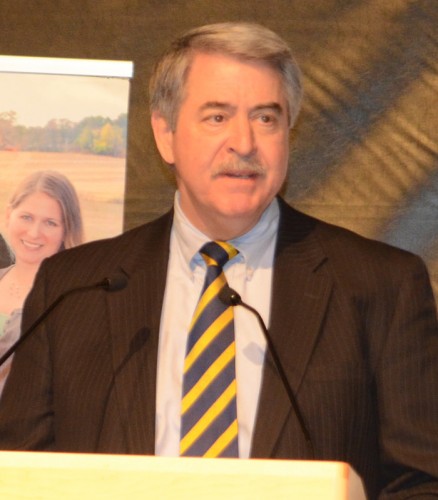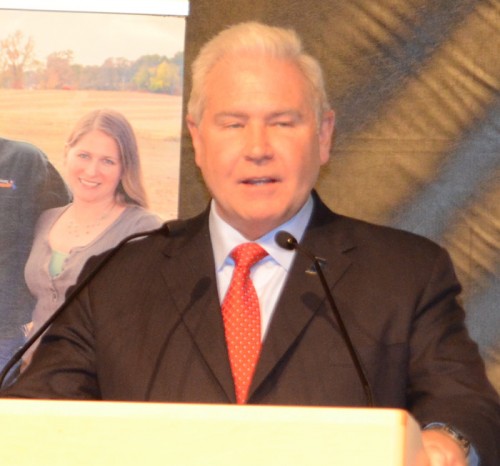Indiana Is Open For Agriculture Business
WINONA LAKE — Jim Schellinger, president of Indiana Economic Development Corporation, and Ted McKinney, director of Indiana State Department of Agriculture and director of agribusiness development for the IEDC, were guest speakers at the second Barns and Business Breakfast, hosted by Kosciusko County Community Foundation and Kosciusko County Farm Bureau.

Ted McKinney, director of Indiana State Department of Agriculture and dirctor of agribusiness development with Indiana Economic Development
“Indiana Building A State That Works” was the focused theme, with the main focus on agribusiness. “In Indiana agriculture, Indiana is open for business,” stated McKinney. He added, some states are clamping down “way to hard on livestock expansion” and due to the Indiana’s fiscal responsibility, livestock business is coming in to the state and people have noticed.
“Not all the expansion is in the epicenter of Indy. A great deal is in the northern third of the state,” McKinney stated. He was pleased to see urban and ag coming together in situation as the morning’s event. “I pray you keep this up. We are so interdependent … there are areas where ag is cast aside, where they don’t want livestock, food process … to their peril. Keep up this wonderful coming together.”
McKinney stated Indiana is still an agrarian state. “I hope we love it and embrace it. There is room for all of us together,” he said. Among the facts presented, McKinney stated 83 percent of the state is still farmland, forest and woodland. The financial impact is that the state has 100,000 jobs supported by agriculture or agribusiness. He noted hardwood lumber is the number one value crop in the state. Also number one in the state and western hemisphere is duck production.
McKinney said things that are closing deals for the state are the triple A bond ratings, the Hoosier Heartland corridor, rail system and having Fed Ex’s number two hub at the Indianapolis Airport. Concern over natural resources puts the state ahead of other states. “I’m so glad you’re talking about attention to water quality.” He relayed Indiana is No. 2 in the nation in acres of cover crops, second to Texas. “Farmers are doing something right,” he said in keeping nitrogen and phosphorous out of the waterways.
McKinney said Kosciusko County is among the most prominent and diverse in Indiana, noting such companies as Louis Dreyfus, CTB Inc., Maple Leaf, Egg Innovation, diary process, interstate advances. He pointed out there are counties within the state tightening up zoning laws, which are becoming disruptive to growth in agriculture. He stressed local officials are the front line for agriculture.
He said in the next six weeks to three months announcements will be made of new additional agriculture and food process businesses in the state. “Several up this way.”
Schillnger presented similar facts, stating Indiana is truly the crossroad of America. “We have more interstate highways than any part of the country. He pointed out the state’s low taxes and low regulations, rankings of the state from third parties in cost of doing business, highway accessibility, lower taxes, availability of skilled labor, regulatory climates, cost of living and other areas.
“More Hoosiers are working now than ever before,” Schillinger stated. He noted the state’s 4.4 unemployment rate. For the county, it ranks number 1 in unemployment at 4.0 percent, No. 17 in per capita income, which is above the national and state average.
“We have a great opportunity here for industries, strong manufacturing, agriculture, automotive. However, the concern is wages and keeping talent in the state and diversification. “The workforce has a huge problem, there is a gap in the job market,” he said noting this gap is jobs requiring little more than an high school diploma to not quite four-year college degree.
Brief comments were also heard from Bob Bishop, president of Kosciusko Farm Bureau and community foundation board member; and Jerry Yeager, board president of the Kosciusko Community Foundation. “I am glad we can come together to offer this educational breakfast for all of us. Together we can create an environment where all our industries and cities thrive and work together for the betterment of our community,” said Bishop.
- Several hundred attended the second annual Barn and Business Breakfast at Manahan Orthopedic Capital Center on the Grace College and Seminary campus this morning. The event provided a breakfast, presentations by speakers and an opportunity for networking with others in the agriculture and business communities.
- Bob Bishop, president of Kosciusko Farm Bureau
- Jerry Yeager, board president of Kosciusko Community Foundation.




